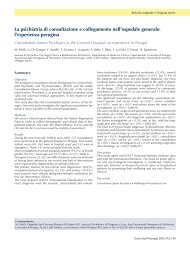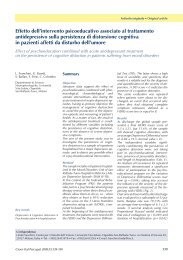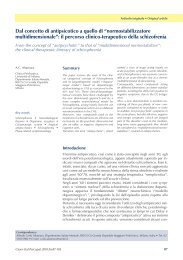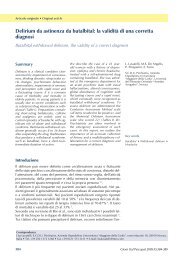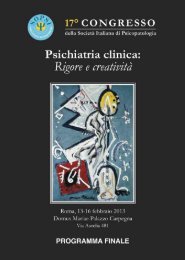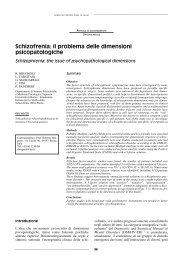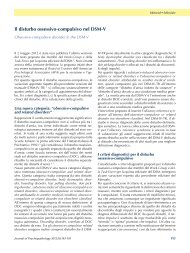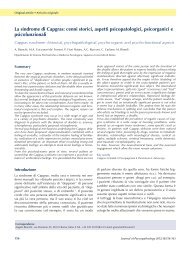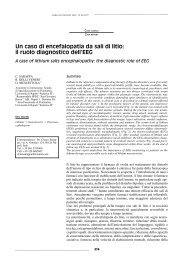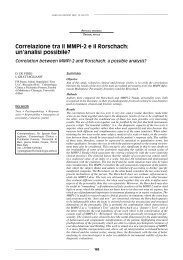XI Congresso della Società Italiana di Psicopatologia Psichiatria ...
XI Congresso della Società Italiana di Psicopatologia Psichiatria ...
XI Congresso della Società Italiana di Psicopatologia Psichiatria ...
You also want an ePaper? Increase the reach of your titles
YUMPU automatically turns print PDFs into web optimized ePapers that Google loves.
fermerò su quanto accade nell’ambito delle situazioni <strong>di</strong><br />
gruppo. Infine, mi soffermerò sul problema dell’ideologia.<br />
Se per ideologia inten<strong>di</strong>amo un pensiero acritico, incapace<br />
<strong>di</strong> apprendere dall’esperienza e quin<strong>di</strong> dall’analisi dell’esperienza<br />
e dell’errore, che non ritiene doversi mo<strong>di</strong>ficare<br />
pur <strong>di</strong> fronte a prove evidenti <strong>della</strong> falsificazione dei presupposti<br />
teorici, allora possiamo <strong>di</strong>re che molte psicoterapie<br />
57<br />
SIMPOSI TEMATICI<br />
sono profondamente ideologiche. Quin<strong>di</strong> è impossibile giu<strong>di</strong>care<br />
la vali<strong>di</strong>tà <strong>di</strong> una psicoterapia, vali<strong>di</strong>tà che è compresa<br />
tra i poli del limite e <strong>della</strong> possibilità? E poi, a chi spetta<br />
il giu<strong>di</strong>zio circa la vali<strong>di</strong>tà? Molto sinteticamente, ritengo<br />
non solo che sia possibile esprimere giu<strong>di</strong>zi circa la vali<strong>di</strong>tà,<br />
ma soprattutto che i giu<strong>di</strong>ci siano gli stessi psicoterapeuti<br />
sempre che conservino un pensiero critico e non ideologico.<br />
22 FEBBRAIO 2005 - ORE 16.00-17.30<br />
SALA VERDE<br />
S19 - La neurogenesi nei <strong>di</strong>sturbi neuropsichiatrici:<br />
nuove prospettive in riabilitazione<br />
Modulazione <strong>della</strong> neurogenesi e <strong>di</strong>sturbi<br />
neuropsichiatrici: dalla preclinica alla clinica<br />
G. Perini<br />
Dipartimento <strong>di</strong> Neuroscienze, Università <strong>di</strong> Padova<br />
La neurogenesi nel cervello adulto umano è ormai riconosciuta<br />
essere un meccanismo <strong>di</strong> plasticità neuronale che,<br />
seppure limitato sia nell’entità che nella sede a poche cellule<br />
progenitrici localizzate nello strato subgranulare dell’ippocampo<br />
e nell’area subventricolare, è <strong>di</strong> notevole importanza<br />
funzionale sia nel cervello sano che in alcune patologie<br />
<strong>di</strong> interesse neuropsichiatrico come la Depressione Ricorrente,<br />
i <strong>di</strong>sturbi post-traumatici da stress, la Schizofrenia<br />
il morbo <strong>di</strong> Cushing, i traumi cranici, l’epilessia temporale,<br />
le fasi iniziali <strong>della</strong> malattia <strong>di</strong> Alzheimer e probabilmente<br />
anche i danni da ra<strong>di</strong>azione.<br />
La particolare localizzazione <strong>della</strong> neurogenesi in un’area<br />
cerebrale, quella dell’ippocampo che costituisce una delle<br />
strutture limbiche filogeneticamente e citoarchitettonicamente<br />
più antiche e che ha un ruolo fondamentale in importanti<br />
funzioni cognitive (memoria episo<strong>di</strong>ca) emotive (regolazione<br />
del tono dell’umore) neuroendocrine (regolazione<br />
dell’HPA e delle risposte allo stress da parte dei glucocorticoi<strong>di</strong>)<br />
può aiutare a comprendere come una sua alterazione<br />
possa intervenire in più <strong>di</strong> un processo fisiopatologico in <strong>di</strong>sturbi<br />
apparentemente lontani fra loro.<br />
La modulazione <strong>della</strong> neurogenesi è stata ampiamente stu<strong>di</strong>ata<br />
in numerosi modelli animali, dal ratto alla scimmia e i<br />
dati preclinici costituiscono ormai una base <strong>di</strong> partenza sufficientemente<br />
ampia per poter iniziare a testare la sua importanza<br />
anche nei modelli umani e nella patologia.<br />
Brevemente la neurogenesi costitutiva ippocampale è stimolata<br />
da una serie <strong>di</strong> fattori ambientali ed ormonali quali<br />
la stimolazione ambientale, la complessità ambientale, fattori<br />
ormonali e neurotrofici, antagonisti dei glucocorticoi<strong>di</strong>,<br />
terapie antidepressive e modulanti il tono dell’umore, mentre<br />
viene inibita dallo stress ambientale pre-postnatale, deprivazione<br />
ambientale, glucocorticoi<strong>di</strong>, farmaci che stimolano<br />
i recettori NMDA o che favoriscono l’excitotossicità<br />
Ca-<strong>di</strong>pendente.<br />
Utilizzando come misure <strong>della</strong> funzione ippocampale e<br />
quin<strong>di</strong> in<strong>di</strong>rettamente <strong>della</strong> neurogenesi in vivo la volume-<br />
MODERATORI<br />
G. Perini, G. Kempermann<br />
tria ippocampale e la memoria episo<strong>di</strong>ca, alcuni <strong>di</strong>sturbi<br />
neuropsichiatrici sono stati correlati ad una sua riduzione<br />
stress/o glucocorticoi<strong>di</strong>-indotta. Scopo <strong>della</strong> presentazione è<br />
quello <strong>di</strong> presentare una breve review degli stu<strong>di</strong> che trattano<br />
questi <strong>di</strong>sturbi da questa particolare angolazione, presentare<br />
alcune linee <strong>di</strong> ricerca e dati preliminari sviluppati dal<br />
nostro gruppo <strong>di</strong> ricerca e proporre anche alcune ipotesi<br />
neurofarmacologiche relative alla capacità delle molecole<br />
antidepressive e stabilizzanti <strong>di</strong> modulare in senso positivo<br />
la neurogenesi, e quin<strong>di</strong> le funzioni ippocampali<br />
Activity-dependent regulation of adult<br />
hippocampal neurogenesis<br />
G. Kempermann<br />
Max Delbrück Center for Molecular Me<strong>di</strong>cine (MDC)<br />
Berlin-Buch and VolkswagenStiftung Research group at the<br />
Dept. of Experimental Neurology, Charité University Me<strong>di</strong>cine<br />
Berlin, Germany<br />
Introduction: this presentation gives an overview of the exciting<br />
recent developments in the field of adult neurogenesis<br />
in the hippocampus and <strong>di</strong>scusses some of the evidence<br />
that a <strong>di</strong>sturbance of adult neurogenesis might contribute to<br />
the pathogenesis of psychiatric <strong>di</strong>sorders. The focus of the<br />
talk is on the activity-dependent control of adult neurogenesisa<br />
and on the possible contribution of adult neurogenesis<br />
to hippocampal function.<br />
Methods: review of own animal stu<strong>di</strong>es and of the relevant<br />
literature.<br />
Results: adult neurogenesis is neuronal development under<br />
the con<strong>di</strong>tions of the adult brain, which in general are nonif<br />
not anti-neurogenic. Neuronal development in the hippocampus<br />
proceeds through a number of identifiable stages,<br />
which are <strong>di</strong>fferentially regulated. Newest data suggest the<br />
mechanisms, by which cognitive and other stimuli reach the<br />
precursor cells and their progeny and how specificity of the<br />
regulation is achieved. Our hypothesis is that adult hippocampal<br />
neurogenesis allows a lifelong optimization of the<br />
mossy fiber connection in the hippocampus and to adapt the<br />
hippocampal circuitry to cope with a level of complexity<br />
frequently encountered by an in<strong>di</strong>vidual.



